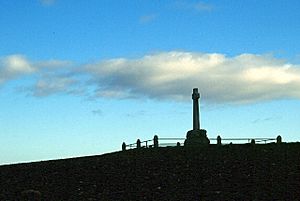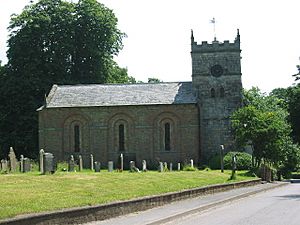Marmaduke Constable (died 1545) facts for kids
Quick facts for kids
Sir Marmaduke Constable
|
|
|---|---|

Memorial at Flodden Field, where Marmaduke Constable was knighted
|
|
| Member of Parliament for Yorkshire | |
| In office 1529–1545 |
|
| Personal details | |
| Born | c.1480 |
| Died | 14 September 1545 (aged 64–65) |
| Resting place | Everingham, Yorkshire |
| Spouse | Barbara Sothill |
| Children | Sir Robert Constable William Constable Everild Constable |
| Parents | Sir Marmaduke Constable, Joyce Stafford |
Sir Marmaduke Constable (born around 1480 – died 14 September 1545) was an important English soldier and politician from Everingham, Yorkshire. He was a Member of Parliament, which means he helped make laws for the country. He was also the great-grandfather of Henry Constable, a famous poet who wrote many poems called sonnets.
Contents
Sir Marmaduke Constable's Family History
The Constable family got their name from an old job called 'constable' of Chester. This job was given to one of their ancestors by Hugh d'Avranches, 1st Earl of Chester, during the time of William the Conqueror.
Marmaduke Constable was born around 1480. He was the second son of another Sir Marmaduke Constable (who lived from about 1456 to 1518). His mother was Joyce Stafford. Marmaduke had three brothers and two sisters:
- Sir Robert Constable (born around 1478 – died 1537). He was a knight and faced severe punishment for his role in a rebellion against the King called the Pilgrimage of Grace.
- Sir William Constable of Hatfield. He became a knight at the Battle of Flodden Field.
- Sir John Constable (born around 1491 – died 1554/6). He was also a knight.
- Agnes Constable.
- Eleanor Constable (died 1525).
Sir Marmaduke Constable's Career and Achievements

Sir Marmaduke Constable held important positions. He was the Sheriff of Yorkshire in 1509–10 and Sheriff of Lincolnshire in 1513–14. A sheriff was like a chief law enforcement officer for a county.
Fighting at Flodden Field
He was a brave soldier and fought in the Battle of Flodden Field in 1513. His father led one part of the army in this battle. After the battle, Marmaduke was made a knight on September 9, 1513, by Thomas Howard, 2nd Duke of Norfolk.
Royal Meetings and Military Service
In 1520, he attended two very important meetings:
- The Field of the Cloth of Gold, where King Henry VIII of England met with the King of France.
- A meeting between King Henry VIII and Emperor Charles V at Gravelines.
Sir Marmaduke also served in wars against Scotland in 1522 and 1523. He was praised for his courage during the capture of Jedburgh and Ferniehirst Castle in September 1523. From 1537 until his death, he was a member of the Council of the North, a group that helped govern northern England.
Serving in Parliament
In 1529, he was chosen to be a Member of Parliament (MP) for Yorkshire. This meant he represented his area in the English Parliament. He was known to meet with other MPs to discuss important matters.
Loyalty to the Crown
In 1536, his older brother, Sir Robert, became a leader in a large rebellion called the Pilgrimage of Grace. However, Sir Marmaduke remained loyal to the King. As a reward for his loyalty, he was allowed to buy Drax Priory, a religious house that had been closed down by the King.
Sir Marmaduke's wife, Barbara, passed away on October 4, 1540. She was buried in the Church of St. Everild in Everingham. Sir Marmaduke made his will in 1541, asking to be buried next to his wife. He lived for four more years and served in another military campaign in Scotland in 1544. He died on September 14, 1545, and was buried in the Church of St. Everild, just as he wished.
Sir Marmaduke Constable's Marriage and Children
Sir Marmaduke married Barbara Sothill (born around 1474 – died 4 October 1540). She was the daughter of John Sothill. Together, they had two sons and one daughter:
- Sir Robert Constable (born before 1495 – died 12 October 1558). He married Katherine Manners. Their second son, also named Sir Robert Constable (died 1591), was the father of the famous poet Henry Constable. Henry Constable wrote a collection of poems called Diana, which was one of the first groups of sonnets published in English.
- William Constable, who became a cleric (a religious leader).
- Everild Constable.
 | Bessie Coleman |
 | Spann Watson |
 | Jill E. Brown |
 | Sherman W. White |

